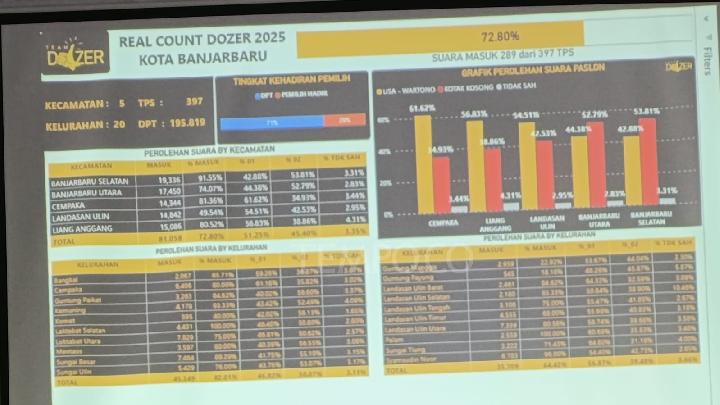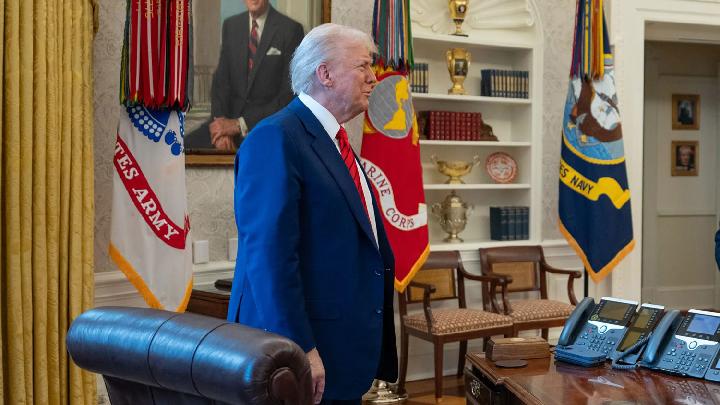TEMPO.CO, Jakarta - As President Donald Trump prepares for his visit to the Gulf, several regional diplomatic sources suggest he may be considering a surprising move: formally recognizing Palestine as a state.
This potential decision, which is reportedly under review, would exclude Hamas, the group that has governed Gaza since 2007. According to The New Arab, the move could mark a major shift in U.S. policy and reshape diplomacy in the Middle East.
The U.S. acknowledgment of Palestine would represent a dramatic change from America's longstanding support for Israel and could be part of a broader strategy to expand the Abraham Accords.
Initiated during Trump's first presidency almost five years ago, the agreement normalized relations between Israel and several Arab countries.
This move may also be a response to Trump's increasing frustration with Israeli Prime Minister Israel Benjamin Netanyahu's refusal to agree to a ceasefire in Gaza amid the ongoing conflict.
The Role of Saudi Arabia and Regional Dynamics
Saudi Arabia has long expressed interest in normalizing ties with Israel, but the 2023 Gaza War brought those efforts to a halt. Riyadh has consistently maintained that any normalization must be preceded by the recognition of Palestinian statehood.
A move by the U.S. to recognize Palestine could further marginalize Hamas and shift the balance of power within Palestinian territories.
At the same time, Trump appears to be pursuing major investment deals with Saudi Arabia. According to Axios, he is expected to return from the Gulf with agreements and pledges worth US$1 trillion, citing information from two current and former U.S. officials and two Arab diplomats.
Trump has hinted at a “very, very big announcement” ahead of the visit, calling it the “biggest of them all” and “very positive.”
Will Hamas be Involved in the Recognized Palestinian State?
The recognition under discussion would likely exclude Hamas, the dominant group in Gaza, and instead bolster the Palestinian Authority’s international standing. This could significantly affect internal Palestinian politics and sideline factions opposed to peace negotiations.
Israel insists that any ceasefire must depend on Hamas relinquishing control and disarming. Meanwhile, Trump openly criticized Hamas during the Gaza conflict, while Palestinian Authority President Mahmoud Abbas strongly condemned Hamas and demanded the release of Israeli prisoners.
According to a Gulf diplomatic source, America's recognition of Palestine would be the "most significant declaration that would change the power balance in the Middle East" and could prompt more countries to join the Abraham Accords.
However, the possibility of Hamas retaining power remains open. On Monday, Hamas released the last remaining American hostage to elicit sympathy from Trump.
Contradictions and Uncertainty
Despite these reports, other sources indicate that the US is reducing demands on Saudi Arabia to normalize relations with Israel as part of nuclear negotiations. This suggests a complex U.S. approach and a potential shift towards Middle East diplomacy.
Furthermore, Palestine is reportedly not on the official agenda for the upcoming US-Gulf summit. Key mediators such as Egyptian President Abdel Fattah al-Sisi and Jordan’s King Abdullah II will not attend the summit. Both leaders have previously rejected Trump’s controversial proposals for Gaza.
The Palestinian Authority itself may approach US recognition cautiously, given Washington’s historic support for Israel and its policies in the occupied territories.
U.S. Ambassador to Israel Mike Huckabee, who is known for his strong pro-Israel views, dismissed online speculation as “nonsense,” underscoring the sensitivity and complexity of the situation.
Impact of Trump's Recognition of Palestine
If Trump does indeed acknowledge Palestine, it will cause a ripple effect in international relations and greatly impact US-Israel relations. Israeli Prime Minister Netanyahu vehemently opposes a two-state solution and has called it a "victory for terrorism."
Trump’s earlier presidency was characterized by strong support for Israel, including moving the US embassy to Jerusalem and brokering normalization deals between Israel and the UAE, Bahrain, and Morocco under the Abraham Accords.
Still, Trump’s unpredictable approach to foreign policy leaves open the possibility of dramatic decisions such as Palestinian recognition, potentially reshaping the peace process and accelerating regional normalization.
So, will U.S. recognition make a significant difference? Ali Jarbawi, a political science professor at Birzeit University in the West Bank, believes it would. Speaking to NPR, he noted that peace negotiations have long been skewed in Israel’s favor.
U.S. recognition, he argued, could shift the balance and provide Palestine with greater leverage.
The U.S. recognition of Palestine would represent a major policy shift, potentially reshaping Middle East geopolitics by altering power dynamics, promoting broader Arab-Israeli normalization, and challenging Israel's current stance on Palestinian statehood.
Recognizing Palestine would mark a major policy change for the U.S., with the potential to alter regional geopolitics, boost Arab-Israeli normalization, and challenge Israel’s current stance.
However, it also risks deepening tensions with Israel and complicating Washington’s relationships with key regional partners, making this a highly consequential and uncertain development.
Editor's Choice: Hamas Frees Edan Alexander, Demands End to Israeli Blockade
Click here to get the latest news updates from Tempo on Google News
















































